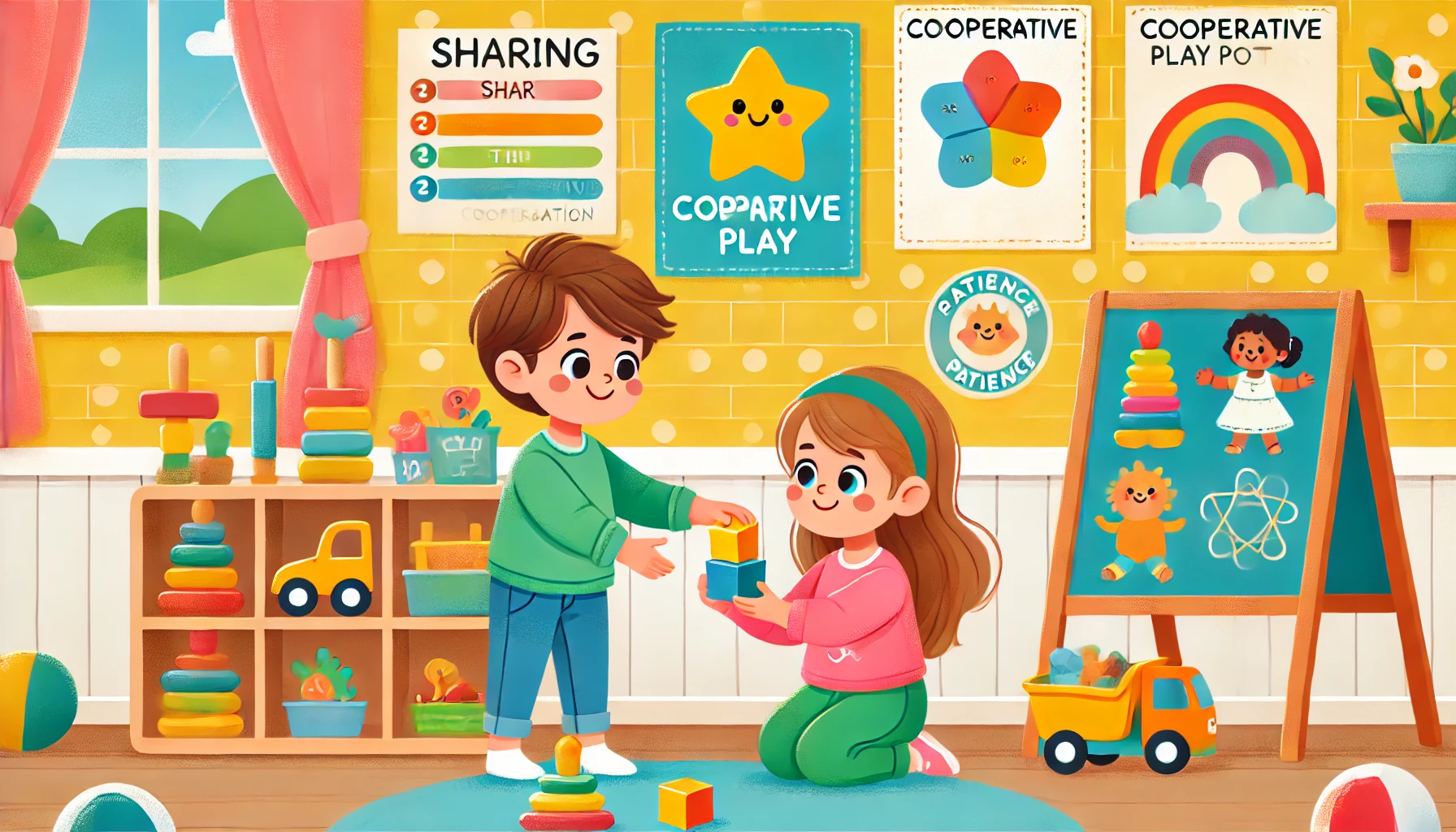How to Teach Young Children About Sharing and Taking Turns
Learning to share and take turns is an important part of early social development. While young children are naturally focused on their own needs, they can learn the value of cooperation and patience through gentle guidance and practice. By making sharing a positive experience, we help children build strong friendships and develop empathy for others.
Why Sharing and Taking Turns Matter
- Builds empathy and cooperation
- Strengthens friendships and group play
- Teaches patience and emotional control
- Encourages problem-solving and fairness
- Prepares children for school and social environments
1. Explain Sharing in Simple, Relatable Terms
Use everyday examples your child understands.
Activity Idea:
- Say: “Sharing means letting someone else use something you like too.”
- Use examples: “We share crayons so everyone can draw.”
- Ask: “How does it feel when someone shares with you?”
What Kids Learn:
- That sharing makes playtime better for everyone.
- How sharing feels good for both giver and receiver.
- The emotional reward of generosity.
2. Practice Taking Turns with Fun Games
Games make waiting and turn-taking easier.
Activity Idea:
- Play games like “Duck Duck Goose” or simple board games.
- Use a timer for turn-based activities: “Two minutes each, then we switch!”
- Cheer for others during their turn: “Your turn—how exciting!”
What Kids Learn:
- Patience and anticipation.
- Joy in both giving and receiving chances.
- Fairness as part of fun.
3. Praise Sharing and Turn-Taking Moments
Positive feedback reinforces the behavior.
Activity Idea:
- Say: “You shared your blocks so nicely!”
- Use visual reinforcement, like a “Sharing Star” chart.
- Reflect at the end of the day: “When did you share today?”
What Kids Learn:
- That their efforts are appreciated.
- Motivation to continue sharing.
- The social rewards of cooperation.
4. Use Books and Stories About Sharing
Stories give children relatable role models.
Activity Idea:
- Read books like Should I Share My Ice Cream? by Mo Willems or Llama Llama Time to Share.
- Ask: “What happened when the character shared? How did it feel?”
- Create your own story together about a character learning to share.
What Kids Learn:
- Emotional connections to sharing.
- Real-life examples through characters.
- The positive outcomes of generosity.
5. Model Sharing and Turn-Taking at Home
Children learn most by observing.
Activity Idea:
- Share food at meals: “I’ll give you some of my apple.”
- Take turns choosing songs or books: “It’s your turn to pick today!”
- Highlight adult examples: “I shared my umbrella with a friend today.”
What Kids Learn:
- That sharing is a family value.
- Practical ways to share every day.
- How adults enjoy cooperation too.
6. Prepare for Challenging Situations
Practice before playdates or group activities.
Activity Idea:
- Role-play with toys: “What if someone else wants to play with the same truck?”
- Talk about feelings: “It’s okay to feel sad about sharing. We can have another turn soon.”
- Use puppets to demonstrate sharing and waiting.
What Kids Learn:
- Emotional coping skills during sharing moments.
- That feelings are normal and manageable.
- Strategies for successful group play.
7. Create Opportunities for Cooperative Play
Encourage activities that require teamwork.
Activity Idea:
- Build a puzzle together, pass the ball, or work on a shared art project.
- Highlight cooperative play: “Look how you worked together to finish the picture!”
- Use phrases like: “Let’s see what we can build as a team.”
What Kids Learn:
- That working together is fun and rewarding.
- How cooperation strengthens relationships.
- The pride of shared accomplishments.
8. Be Patient and Consistent
Learning to share takes time and practice.
Activity Idea:
- Stay calm during struggles over toys: “Let’s try again in a minute.”
- Encourage progress, not perfection.
- Celebrate small wins: “You waited your turn so patiently!”
What Kids Learn:
- That learning is a process.
- How to improve with practice.
- That they are supported in their growth.
Final Thoughts
Teaching young children about sharing and taking turns helps them build strong social skills that last a lifetime. Through stories, play, praise, and patient guidance, children learn that cooperation makes playtime more joyful and friendships stronger. With practice, they’ll discover that sharing isn’t about losing something—it’s about gaining connection.
